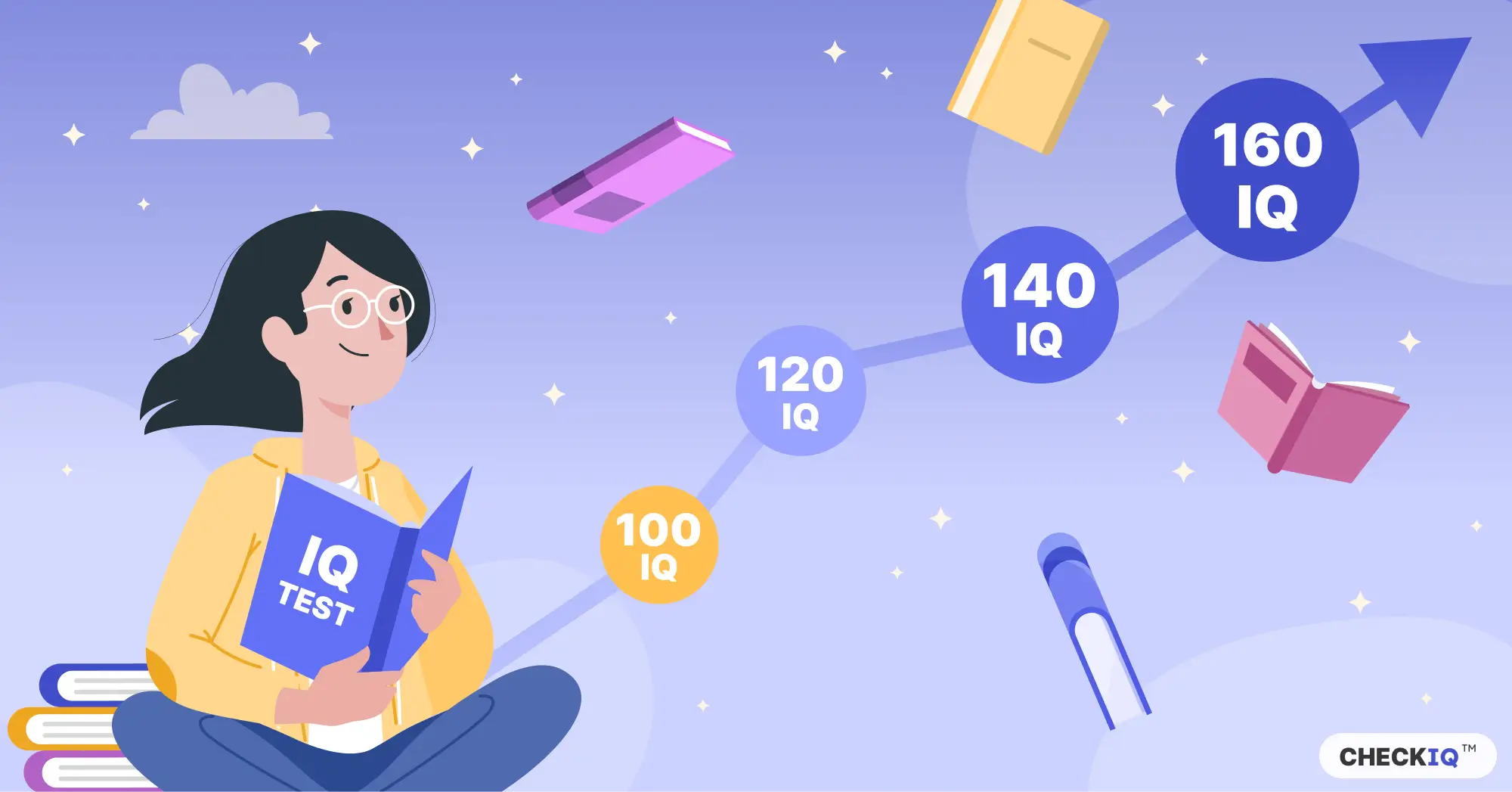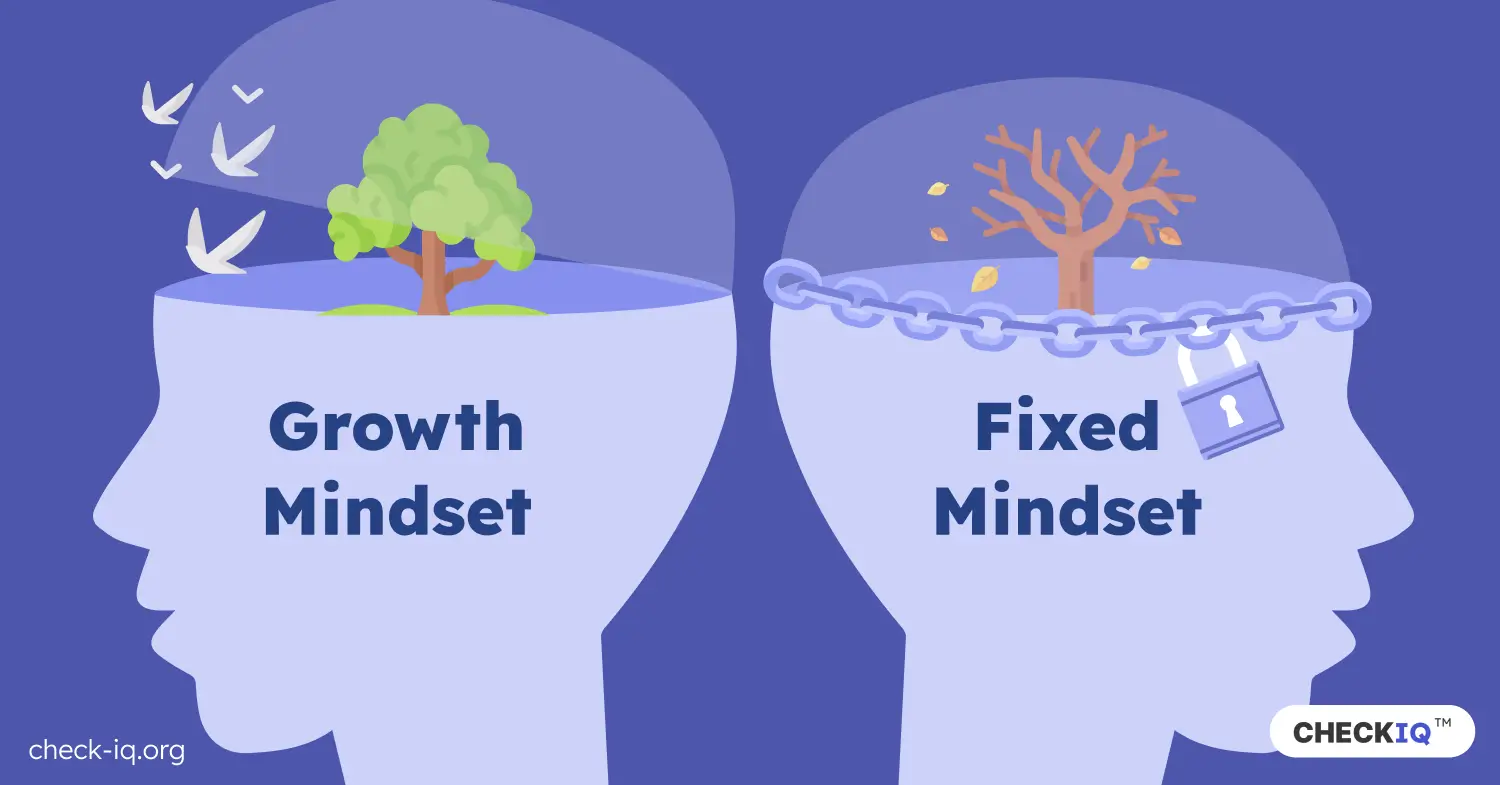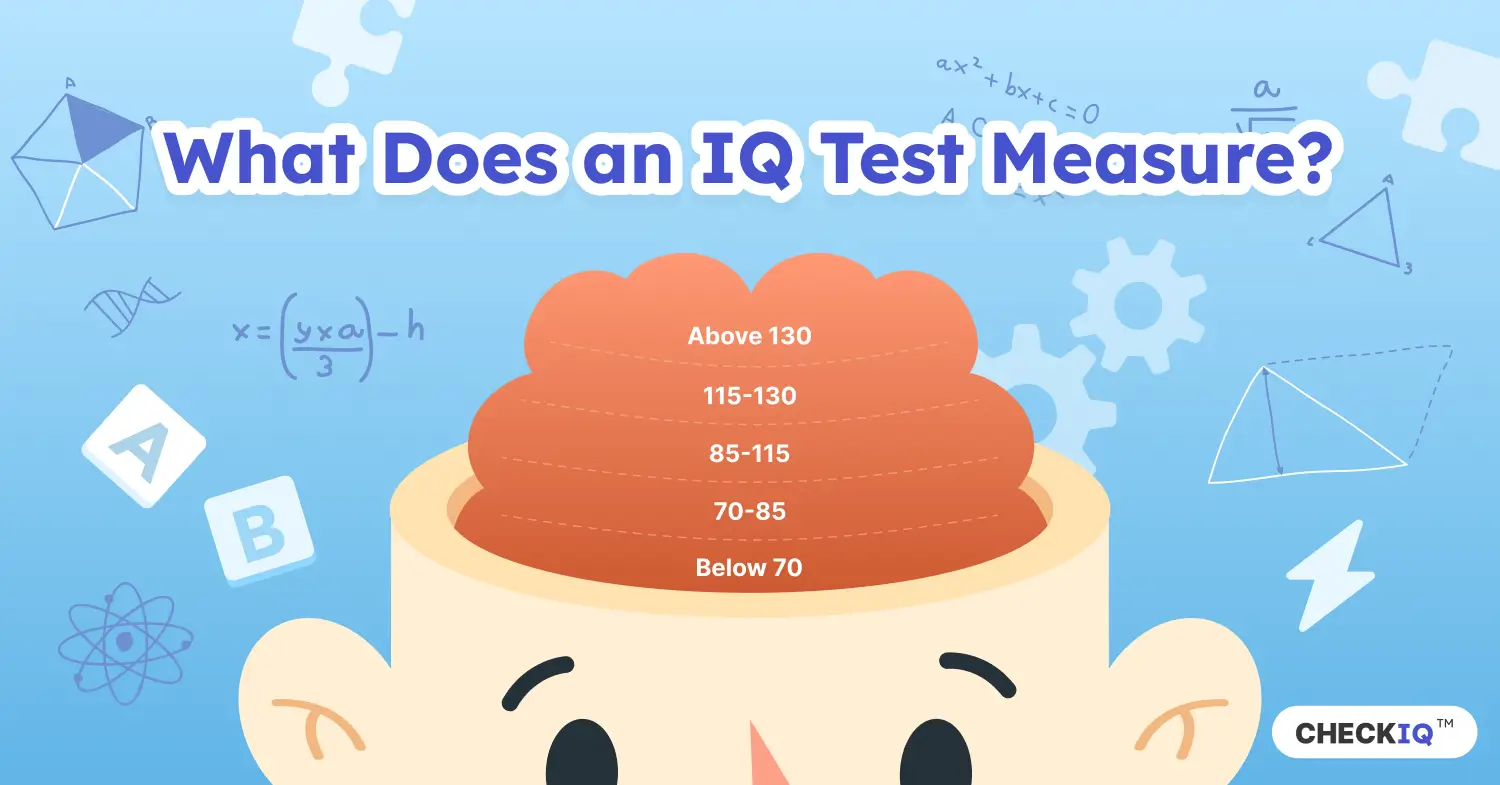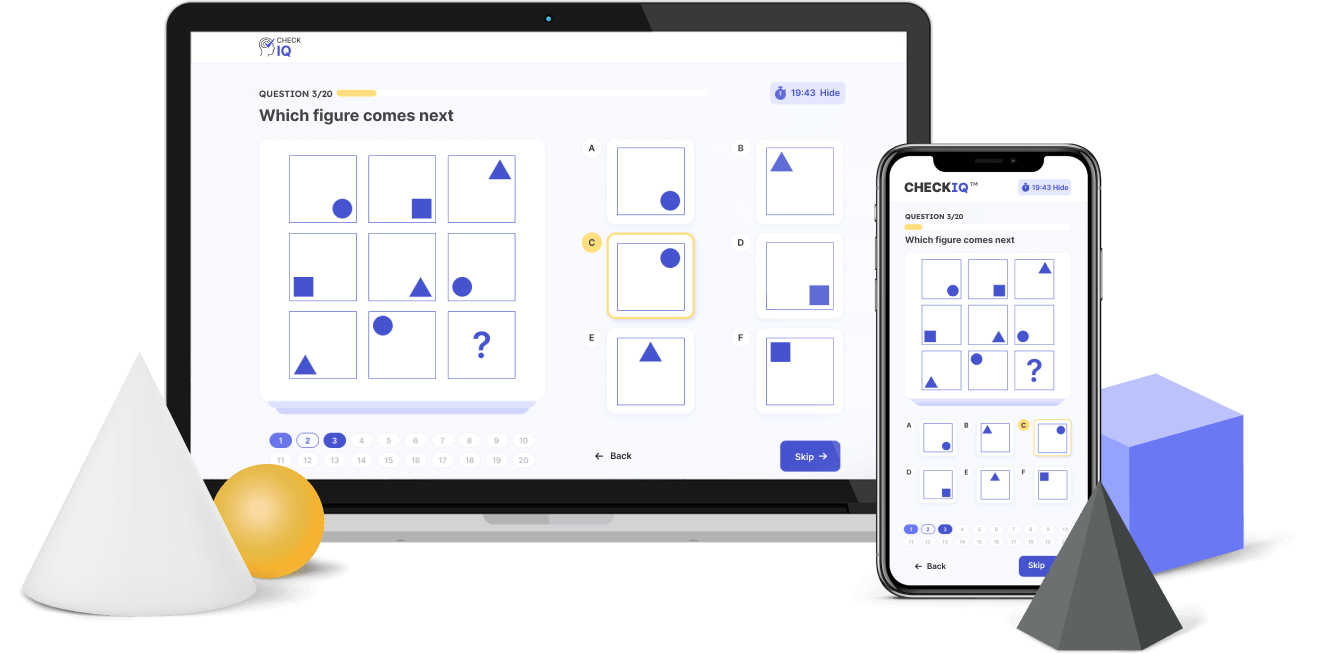Most people aim to achieve the highest IQ test score possible, whether it's to understand their strengths and weaknesses in various cognitive areas or simply to get an ego boost. But what if one could study for an IQ test? Would that even be worth it?
Well, even though you cannot plan for the specific questions on an IQ test, it is possible to study for the different types of questions.
Below, I will break down information on what an IQ test is, what to expect, and how to study for an IQ test and improve your score. I’ll also talk about the best materials to help you raise your IQ scores, should you decide to study!
What You Need to Know About IQ Tests
One of the best ways to improve your IQ test score is to know what you’re up against. Let’s take a closer look at what an IQ test is and the types of questions to expect.
Understanding IQ tests
Intelligence quotient (IQ) tests measure your intellectual and cognitive abilities. Psychologists and researchers use them to understand how individuals process information, solve problems, and learn new concepts.
IQ tests are structured in a way that challenges the brain, requiring quick, accurate responses to problems. At the core, they evaluate various aspects of intelligence, pattern recognition, analytical thinking, quantitative ability, including memory, and spatial recognition.
At the end of the test, you’ll receive an IQ score. This is accepted in some communities as a measure of a person’s mental capabilities and intelligence, however, IQ scores are controversial. While they do test things like reasoning, working memory, and learning ability, they are not an “all-around” intelligence score. IQ scores are flawed because there are areas of intelligence that are not tested.
However, they do serve a useful purpose outside of just pinning down a number. They aim to identify strengths and areas for growth, which can be pivotal for educational and professional development.
A reliable 100% adaptive online IQ Test. Get your IQ score immediately.
Start My IQ Test
The question types to expect on an IQ test
Knowing the types of questions to expect when testing IQ won’t necessarily raise your score. However, it does give you the option of practicing and making yourself familiar with the types of questions on the test. Here are the types of questions you should prepare for on an IQ test:
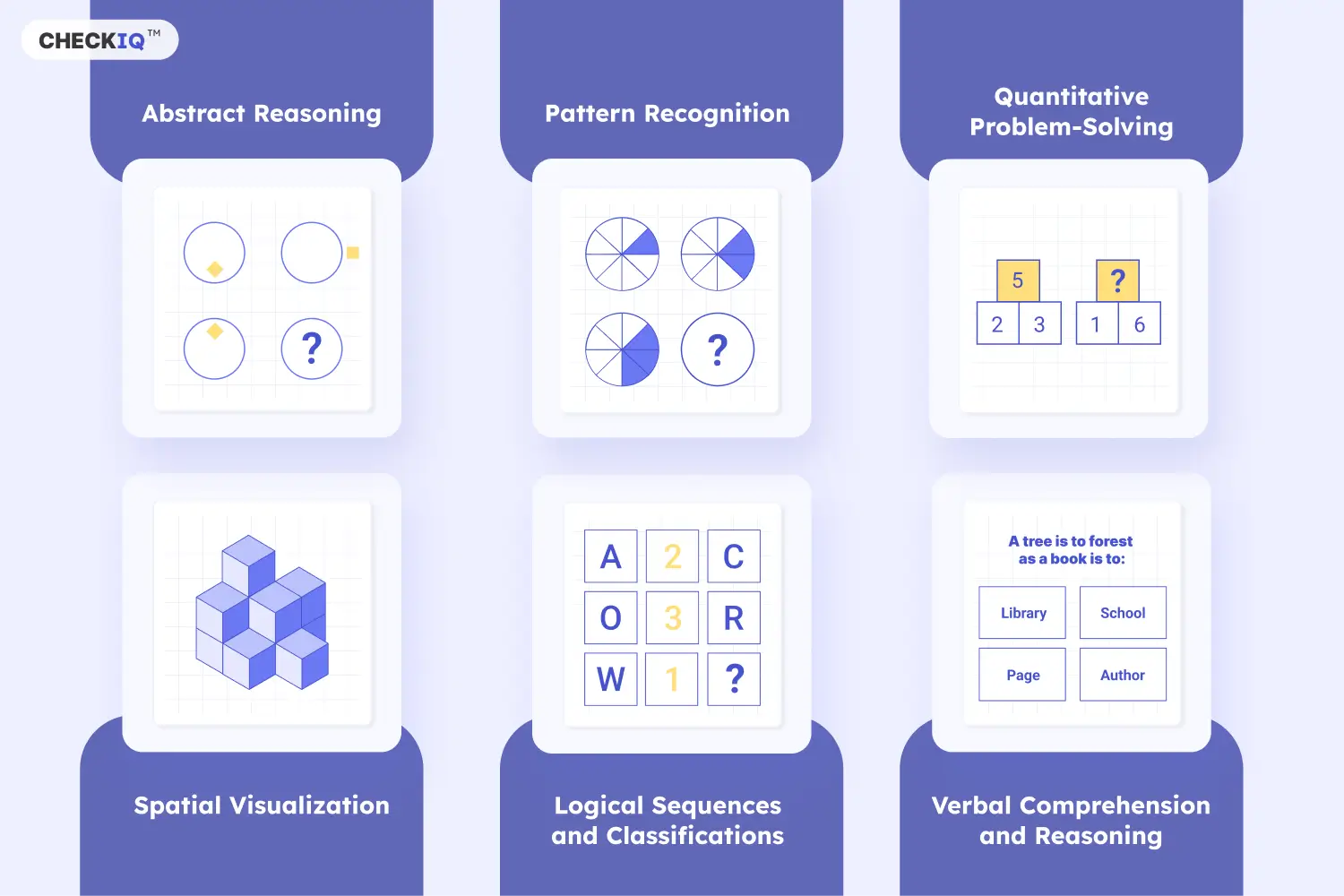
- Abstract Reasoning: Often presented through non-verbal content such as sequences of shapes or patterns, these questions test your ability to identify relationships, analyze patterns, and solve problems logically. Abstract reasoning questions assess fluid intelligence, the capacity to think logically, and the ability to solve problems independently of acquired knowledge.
- Pattern Recognition: Questions about pattern recognition require you to discern and predict patterns. These may be visual or use numbers or symbols. Pattern recognition is fundamental to both abstract reasoning and specific tasks like number series or visual puzzles. It reflects analytical and problem-solving skills.
- Quantitative Problem-Solving: These questions evaluate mathematical understanding and numerical problem-solving ability. Questions about problem-solving may range from basic arithmetic operations to more complex questions involving algebra, geometry, and data interpretation. Quantitative problem-solving questions measure your ability to apply mathematical concepts to solve a variety of problems.
- Spatial Visualization: Spatial intelligence is tested through questions that ask you to manipulate and visualize two- and three-dimensional shapes. Tasks may include mental rotation, mirror images, or spatial orientation challenges. These questions assess your ability to understand and navigate spatial relationships, crucial for fields requiring strong spatial skills like engineering and architecture.
- Logical Sequences and Classifications: These questions challenge you to apply logic to sequences of objects, numbers, or symbols by asking you to identify underlying rules that govern these classifications. Logical sequences and classifications are used to evaluate logical reasoning and critical thinking capabilities.
- Verbal Comprehension and Reasoning: Questions on verbal comprehension and reasoning assess language skills, including vocabulary, understanding of grammar, and reading comprehension. This may be done using analogies, sentence completion, and comprehension passages. It's essential to recognize that the emphasis on verbal reasoning can vary across IQ tests. Some tests may minimize or exclude verbal reasoning components to avoid linguistic biases, especially in multicultural or non-native English-speaking contexts, aiming for a more culturally fair assessment of intelligence.
Can Practice Really Improve Your IQ Test Score?
Yes, practice really can improve your IQ test score. While there is no way to study for the exact questions on an IQ test because they vary, it is possible to practice the most common types of questions and give yourself a better chance at a higher score.

The power of practice
Evidence suggests that practice can indeed improve IQ test scores, according to findings reported by Cornell University. Unlike the average test where you try to cram knowledge, however, practicing for an IQ test involves engaging in different activities. Rather than repeating tasks, you’ll focus on stimulating different cognitive functions. Such practices can bolster memory, critical reasoning, and language skills –key components tested during an IQ test.
As you practice, you’ll become familiar with question types and patterns. Then, you can develop more efficient strategies for tackling them. This approach doesn't just prepare you for the kinds of problems you'll face; it enhances your overall problem-solving skills. This is how it gradually improves your IQ scores over time.
The importance of diverse training
Take a moment to consider the training regimen of athletes. Athletes work on multiple skills to achieve excellence. Often, their regimen targets different groups of muscles, strength, endurance, nutrition, and other areas.
Just like an athlete, it’s important to train different areas of the brain for cognitive improvement. If you regularly practice IQ tests, you’ll become familiar with question types and patterns. From here, you can develop more effective problem-solving strategies, and in turn, can incrementally increase IQ scores.
Activities requiring cognitive flexibility and fluid reasoning, such as playing strategic board games or navigating complex decision-making scenarios, are also beneficial. These exercises not only prepare you for IQ tests but enhance your intellectual capability in general, reflecting the dynamic problem-solving seen in IQ assessments.
How long does it take to see improvement in IQ?
A study from the University of Sydney looked into how solving tough puzzles can boost IQ scores. They found that after three years of focusing on creative problem-solving, one group's IQ scores went up by an impressive 15 points more than another group who didn't get this training. This shows that working hard on different brain-challenging activities, especially for young adults around 18 to 19 years old, can make your brain much sharper.

But do you really need to prepare for three years? Absolutely not. In fact, the Wall Street Journal reported that in just a few weeks of doing these brain exercises, you could see an improvement in your IQ score. Just think of the brain as a muscle. The more that you flex your problem-solving capabilities, the easier it will be to solve the types of questions found on the average IQ test.
Improving your IQ in the real world
You may even increase your IQ without even realizing it! A study by researchers from the Department of Psychology of the University of Victoria in Canada, observed 250 adults for six years. They evaluated intelligence using brain teasers. Over these six years, those individuals in jobs where they solved complex problems or worked with complicated systems and relationships had an easier time completing brain teasers when re-evaluated.
What Is the Best Way to Study for an IQ Test?
When studying for an IQ test, it’s important to use a comprehensive approach that flexes different mental muscles. You’ll need to study for different cognitive areas to be effectively prepared. Here's a structured method to guide your study efforts:
Getting familiar with test structure
The best way to get familiar with the structure of an IQ test is to take them regularly as part of your study routine. You’ll learn more about the format, time limits, and type of questions you'll encounter, providing essential insights into the real test environment.
Additionally, regular practice trains your brain to process information more swiftly and accurately. This is crucial for processing information and achieving higher IQ scores. Aim for a mix of exercises to challenge different cognitive domains and build the mental endurance needed for the test.
Develop strategies for each question type
Moreover, invest time in developing strategies for different question types. Rather than memorizing the answers, your focus should be on understanding the underlying logic of questions. It’s also important to study consistently, over time. Cramming is not as effective at boosting your cognitive aptitude and potential IQ scores as consistent, regular study sessions.
Practice on a diverse set of questions
Since IQ tests measure your intelligence quotient rather than specific factual knowledge, you should focus on exercises that develop a wide range of cognitive skills. This is more beneficial than memorizing information. Additionally, this approach ensures you're prepared for the diverse challenges IQ tests present, from logical reasoning to spatial navigation.
Research by the University of Sydney suggests that problem-solving exercises can bolster IQ points by a considerable margin in late adolescents. Given this, it's clear that training your brain to solve problems creatively aids in reducing the gap in performance across different ability levels. It can also help keep your brain sharp, reducing the natural decline of IQ that comes with age for many people.
Speed and accuracy training
Focusing on both speed and accuracy is vital during training, as IQ tests are often timed. Alternating between different types of practice tests can also help you become comfortable with the variety of questions you might face. This dual focus improves your ability to perform under the pressure of time constraints, mirroring the conditions of actual IQ assessments.
Engaging in diverse mental workouts
Broadening your cognitive training beyond traditional practice tests can further enhance your IQ potential. Engage in activities that challenge your memory, spatial reasoning, and problem-solving skills:
- Memory Exercises: Puzzles and card games can boost your mental flexibility, helping you to quickly recall and apply information.
- Visuospatial Skills: Activities like navigating mazes or constructing models are effective for improving your ability to interpret spatial information, a common element in IQ tests.
Such varied exercises improve your analytical abilities, enabling you to identify patterns and solve complex problems more efficiently.
Use targeted training programs
Another option is to consider incorporating structured IQ training programs into your preparation. Programs based on Relational Frame Theory, for example, have shown significant success in raising IQ levels. These formal training methods complement informal strategies like strategy games and daily problem-solving tasks, offering a balanced and effective way to enhance cognitive abilities.
Motivate yourself
Studies have demonstrated that motivation plays a critical role in how well individuals perform on cognitive tasks, including IQ tests.
One way to motivate yourself is to recognize and celebrate your achievements along the way. Whether it's through small rewards for daily goals or larger incentives for milestones, acknowledging your progress can boost your motivation and commitment.

Additionally, just like your mindset can affect your IQ, maintaining a positive attitude is crucial. Encourage yourself with the knowledge that cognitive abilities can improve with effort and remember that challenges are opportunities for growth. Persistence in the face of difficulty is key; remember that every problem solved is a step closer to your goal!
Don’t overlook your physical health
Let's not overlook the impact your physical health can have on your cognitive performance. Upholding a balanced diet, ensuring adequate sleep, and engaging in regular stress management activities like exercise can boost both your body and your IQ test results. Ever noticed how a good night's sleep or a peaceful walk can clear the fog in your mind? That's your body contributing to your brain's optimal performance. Plus, these healthy habits do wonders for your memory retention and stress tolerance - both highly relevant when aiming for top IQ scores.
Finally, here's a tip you might not expect: learn to relax and let your mind wander. This can also play a key role in your intellectual fitness. Harvard research suggests that downtime, including napping and daydreaming, activates your brain's default mode network, which is essential for creativity and memory. This 'intelligent cognitive rest' is as crucial to your preparatory regime as the rigorous problem-solving exercises.
Mastering Test-Day Strategies for Optimal IQ Scores
Now that we’ve talked about how to best study for your test, let’s talk about some test-day strategies that can help you achieve the highest score possible. Keep in mind that what you do the night and morning before your test is as important as studying for the IQ test if you want to achieve optimal scores.
How should you approach IQ test questions?
When the test day arrives, it's all about strategy. One of the best tactics? Have a well-thought-out approach to answering IQ test questions.
The key is to avoid rushing through the test. Instead, pace yourself. Begin by tackling the questions you find easiest. This method helps build confidence and set a positive tone as you accumulate correct answers. Plus, it conserves precious time for the more challenging parts of the test.
Time management is also critical to your test strategy. Divide the total test time by the number of questions to figure out how many minutes you can devote to each. It's okay to skip a question if you're stuck - as long as you remember to come back to it later if there's time. This prevents you from getting bogged down and ensures you answer as many questions as possible.
Strategically guessing is another aspect to consider. When you're unsure, first try to eliminate the most unlikely answers. This increases your chances of selecting the right one from the remaining options. Also, remember that unanswered questions on most IQ tests do not add or subtract from your score, so a smart guess could potentially give you extra points.
Another thing to remember is that some tests, such as adaptive IQ tests, get more difficult as they progress. If you know this is the case, budget more time for the latter part of the test, and don't be disheartened if questions seem to get harder. It's part of the design, and it doesn't mean your performance is dropping.
Keeping calm under pressure
Test anxiety is a common challenge, but there are ways to keep it under control.
To start, ensure you've had a good night’s sleep before test day. Sleep can be a superpower - it rejuvenates the brain and improves concentration, memory, and problem-solving abilities, all of which are central to performing well on IQ tests. A good night’s sleep has been proven much more beneficial to test scores than cramming the night before.
Breathing exercises can also significantly calm your nerves. Practice deep breaths to maintain a relaxed state of mind, especially if you start feeling overwhelmed. Taking deep, slow breaths helps lower stress and enhances mental clarity, priming your brain for the task at hand.
As I mentioned earlier, it's also important to maintain a positive attitude. Believe in your ability to succeed and remind yourself of the practice tests and preparation you've completed. Past successes can serve as a reminder that you're fully capable of tackling the test before you.
Finally, let's not forget the importance of breaks. While it might seem counterintuitive to stop when every minute counts, short breaks can help refresh your mind and prevent fatigue. A brief pause to close your eyes and stretch can make a significant difference in staying sharp throughout the test session.
On test day, with the right strategies at play, you'll not only have prepared your mind but also set the stage for achieving your best possible results. Remember, taking control of the time you're given and finding your calm can turn test-day pressures into high scores.
IQ Test Preparation Resources
Finding the right materials to prepare for your IQ test can be as crucial as the studying itself. There's a wealth of books and online tools out there designed to guide you through the intricacies of IQ tests. Here are a few of them:
Books
Books have always been a reliable source for test preparation. Many IQ books offer detailed explanations of varied question types you'll encounter and provide tactics to tackle each one. You’ll also typically find practice tests with answers and explanations. These can be invaluable for understanding where and why you might have gone wrong. If you're attempting the Mensa test, books specifically geared towards Mensa's unique format can be particularly beneficial.
Online IQ tests
Online tests are a fantastic way to gauge your current level and practice under similar conditions to the actual IQ test. Furthermore, they can identify strengths and weaknesses so you know where to concentrate your studying efforts.
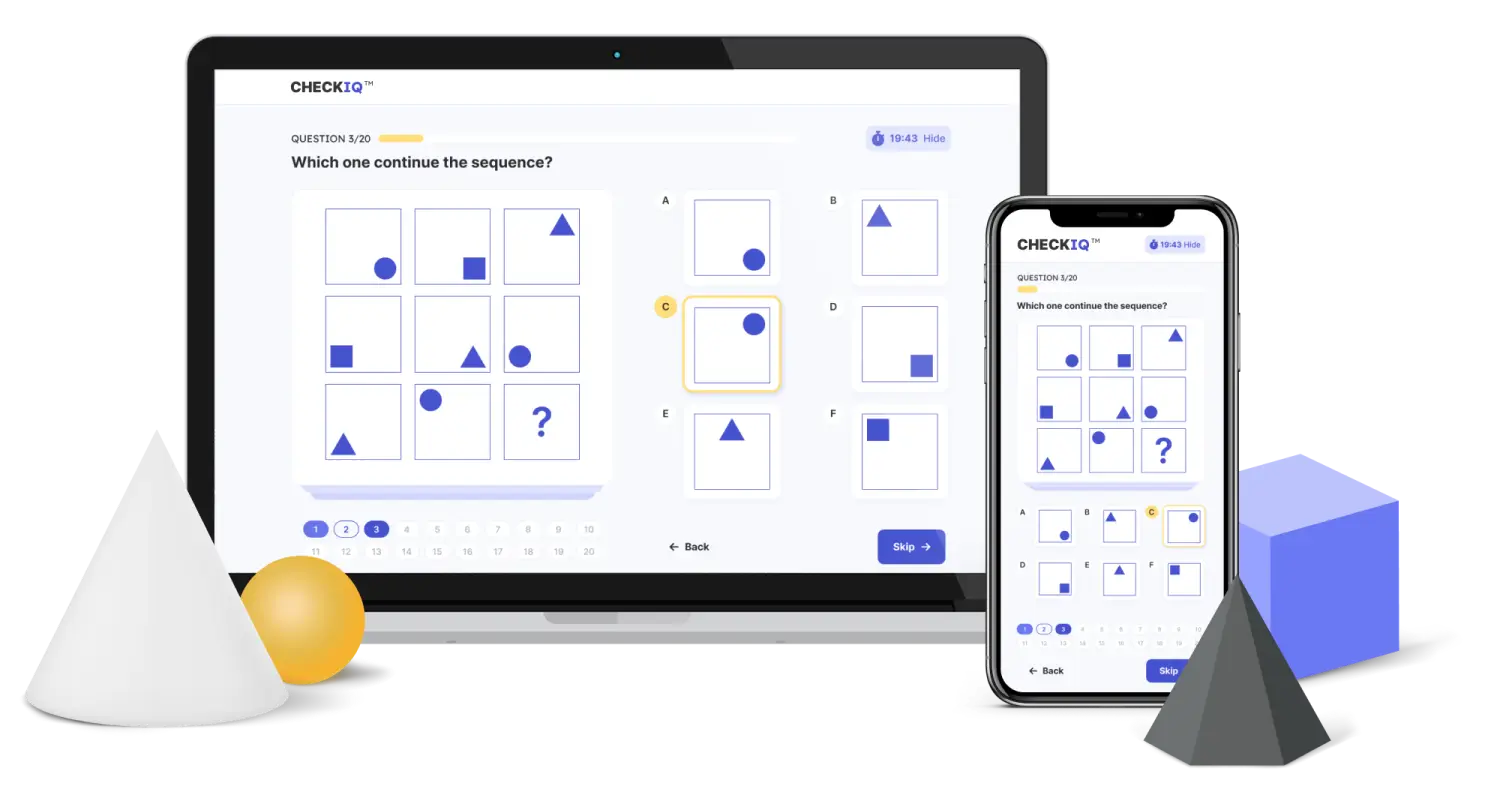
Online IQ test sites will give you not just a variety of questions and timed tests, but also instant feedback on your performance. Most sites show a fixed set of questions. But a few online IQ sites are “adaptive”. They use algorithms to adapt their difficulty levels in real-time to your ability, ensuring you're always challenging yourself at just the right level.
Cognitive games
Computer games that train specific cognitive skills, such as the n-back game, show promise in enhancing aspects of intelligence like fluid intelligence, which can be integral to IQ tests. Fluid intelligence, the ability to think quickly and reason flexibly, is a critical component of many IQ tests. Games let you practice these skills in a way that is engaging and fun. Plus, the fast pace may improve how quickly you can evaluate information and solve problems.
Online forums
Many online platforms offer more than just practice questions. They include video tutorials, step-by-step problem-solving guides, and interactive forums like Reddit where you can discuss strategies with other learners. For those seeking a more structured approach, online courses, some even led by experts in the field, can provide you with a schedule of learning that covers all bases of IQ test preparation.
FAQs: Common Questions About IQ Tests
To wrap this up, I’ll provide some additional information on frequently asked questions regarding IQ tests.
Are there specific foods that can boost your IQ Test performance?
Yes, certain foods, often branded as superfoods, have been shown to support brain health and may boost cognitive function. Foods rich in omega-3 fatty acids, such as fish, flaxseed, and walnuts, promote neural health and may improve mental skills important for IQ tests. Antioxidant-rich berries, dark chocolate, and nuts can protect the brain from oxidative stress, possibly enhancing your memory and problem-solving abilities.
In addition, consuming foods that stabilize your glucose levels, like whole grains, may prevent the energy crashes that can hamper your concentration during a test. Pairing these with a balanced diet that includes leafy greens, fruits, and protein can enhance overall brain function.
Remember, while incorporating these superfoods into your diet can be beneficial for your brain, they're part of a larger lifestyle focus that includes adequate sleep, regular physical activity, and stress management - all of which can contribute to better performance on an IQ test.
Why is preparation vital for excelling in the Mensa test?
Mensa is one of the most famous high-IQ clubs. Preparation is key to excelling in the Mensa test because Mensa's benchmark for high IQ is set at the 98th percentile of the general population. That means you'll need to score higher than 98 percent of those who take the test to qualify for Mensa - which demands not just natural intelligence but also strategy and familiarity with the test format.
Undertaking practice tests is particularly crucial for success in the Mensa test as they acclimate you to the kinds of questions you might encounter. These practice sessions help build up your test-taking stamina, ensuring that you can maintain focus and concentration throughout the exam.
Moreover, since the Mensa test is designed to challenge even those with a high intelligence quotient, brushing up on your test-taking techniques, fine-tuning your timing, and learning to navigate tricky questions are aspects that can make a significant difference in your test results.
Do IQ scores change over time?
The structure and scoring of these standardized intelligence tests are constantly evolving. In fact, research from the University of Houston revealed an interesting trend known as the "Flynn effect," which suggests that people's IQ scores have steadily increased over generations. However, more recent studies have observed a "reverse Flynn effect", indicating that in some regions, IQ scores have started to decline.
This demonstrates that the average IQ of a population can change over time due to various factors, including environmental influences and educational practices.
Remember, understanding the fundamental makeup of these tests is your first step towards more effective study and preparation. It helps demystify the process and sets you on the path to potentially boosting your intellectual quotient.

